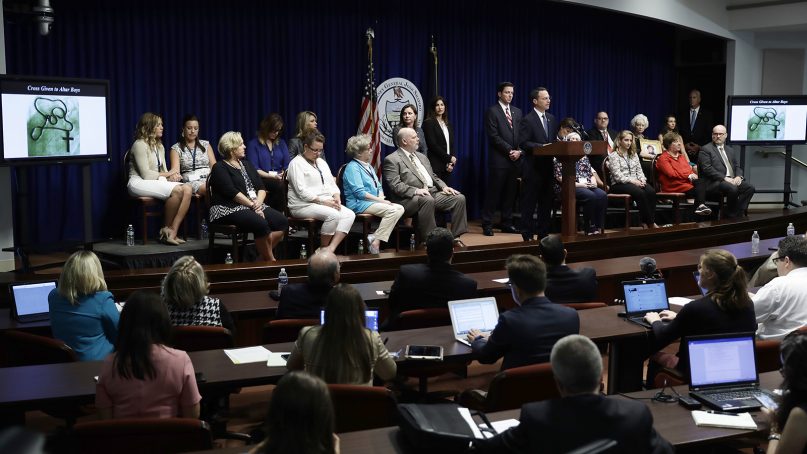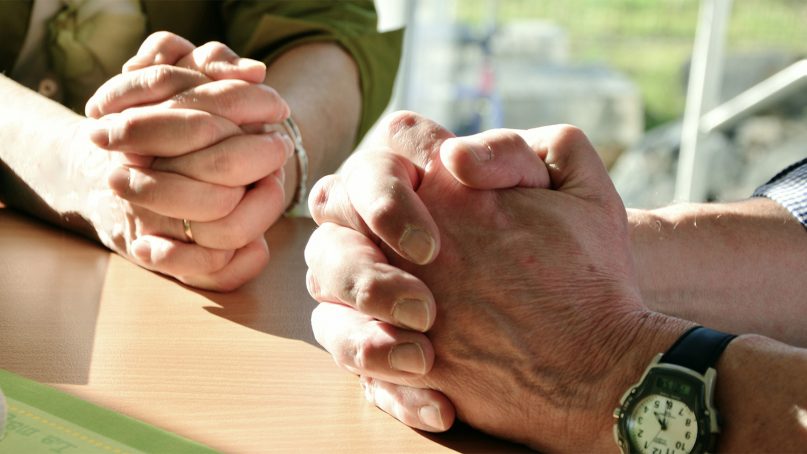(RNS) — A common theme running through our religious traditions is the idea of restoration: What exactly is wrong with us and the world around us? How did the Edenic ideal go awry? And how will God set things aright, redeeming his creation and reconciling it to the divine?
We seem to share a sense that in our era of road rage, online insults and distrust of authority in all its forms, there has been a waning capacity to put things back together, even as brokenness abounds. At the same time, a common religious literacy, vocabulary and salience have waned.
We have perfected the art of viewing others skeptically and not being surprised when people let us down and when leaders or institutions have moral failings. But when things fall apart, like when religious leaders enter areas of sexual sin or when men abuse their power and strength to victimize women (or both), we are not so good at repairing relationships. In fact, we are at a loss for how to begin.
The Catholic sex abuse crisis, which resurfaced this week with a damning 1,300-page grand jury report in Pennsylvania detailing widespread abuse and an unconscionable cover-up, brings these dynamics to light and demands their urgent consideration.
Religious traditions have varying emphases, but in general we cannot agree about when to lop off the offender and when to reconcile. Does the evangelical impulse for purity lead to viewing offenders as toxic? Does the Catholic reverence for itself as an institution lead us to look away from sins and crimes?
Each faith tradition has its distinctives, but all bring insight to our cultural confusion about punishment and redemption. Judaism inaugurated ethical monotheism, the belief that God is one and is concerned with our actions. Islam emphasizes submission to God’s will. Calvinists focus on God’s holiness and human fallenness. Wesleyans emphasize grace.
The Episcopal Church’s Book of Common Prayer has for centuries taught us to address “Almighty God, unto whom all hearts be open, all desires known, and from whom no secrets are hid.”

Pennsylvania Attorney General Josh Shapiro speaks during a news conference at the Pennsylvania Capitol in Harrisburg, Pa., on Aug. 14, 2018. A Pennsylvania grand jury’s investigation of clergy sexual abuse identified more than 1,000 child victims. The people seated were some of those affected by the clergy abuse. (AP Photo/Matt Rourke)
But secrets are hidden (at least from human perception) in every human heart. And when they are discovered, we lack a common religious framework for exactly how to proceed.
Appropriately enough, we do have a legal system that promises equal justice under the law. But that goal is elusive and often fails to deliver on moral imperatives. Even when the system works, it says nothing about the difference between sins and crimes. Criminal codes regard the state as the victim. That dynamic obscures the already broken relationship between victim and offender while minimizing the need for restoration, a central religious preoccupation.
Should forgiveness and reconciliation remain distant religious ideals — hypothetical niceties that have no place in common law or in our daily lives? Or should we recover the lost art of redemption, and use our instruments of law and justice to restore rather than to shun?
All this is complicated enough in theory and in practice. Often, it is hard to predict whether a person can be redeemed. Consider, for example, political leaders who are caught in sex scandals. Some continue serving or return to public life, while others are never heard from again. This is a common enough occurrence, and yet we have no good explanation for why some careers are ended while others make a comeback. Does it depend on the person’s own experience with God?
We intuitively know that the conditions for restoration vary with the severity of the offense: We can re-elect a fallen politician to office. We do not send predator priests back into parishes if we’re living up to our responsibilities. Restoration for them needs to take other forms, including penance and making amends. Yet many would rather just lop them off and ignore the higher mandate to make restoration possible.
One bright spot and potential innovation in our ongoing struggle to heal relationships with people who have disappointed us is the growing imperative in our collective conscience to take into account the experience of the victim. As a wave of famous and powerful men finally face the consequences of long histories of hypocritical, harmful and degrading treatment of women, we seem to finally be getting better at focusing on the actual harm that is done to people who experience abuse, intimidation and violence.
Yet we are still deficient in nurturing public manifestations of practices that we can’t afford to leave cloistered in religious settings: confession, contrition, repentance, penance.
Our faith traditions are well-equipped to supply images, languages and stories about redemption that our culture sorely lacks. We struggle to know how or when to forgive. We muddle through imperfect human justice. But we find guidance in our traditions, and we do well to imitate divine mercy. Figuring out how to put such lofty ideals into practice is never easy. But a more worthwhile or urgent project for our time would be difficult to imagine.
(Jacob Lupfer, a frequent commentator on religion and politics, is a writer and consultant in Baltimore. The views expressed in this commentary do not necessarily represent those of Religion News Service.)





